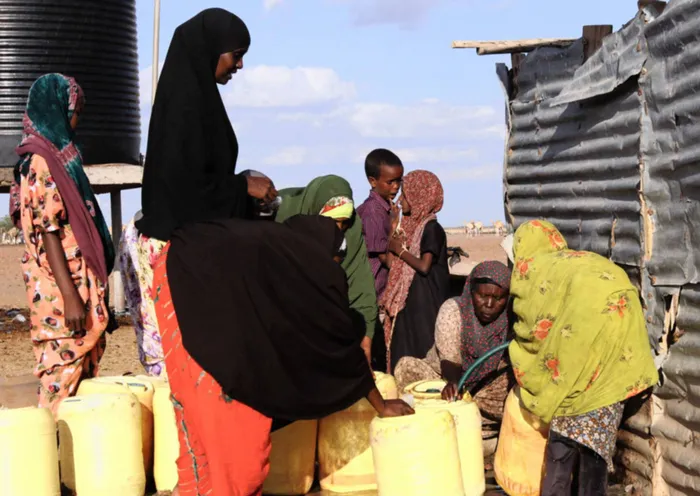Involve women religious clerics (ustadhas) more in countering violent extremism in Kenya

Picture: Khalil Senosi/AP/File – With the surge in terrorist-related violence in Kenya, radicalisation and recruitment statistics reveal a worrying trend, with young women and girls becoming easy targets for terrorist organisations, making them both a social and security problem, the writer says.
By Mwachofi Julianna Chao and Daniel Iberi
The last decade has seen a surge in terrorist-related violence in Kenya, mostly by the al Shabab, an al Qaida affiliate in the Horn of Africa. Radicalisation and recruitment statistics reveal a worrying trend. Young women and girls have become easy targets for these terrorist organisations, making them both a social and security problem.
In response to the spike in terrorism activities in the country, the Kenya government formulated counter-terrorism and deradicalisation policies including, the Prevention of Terrorism Act (2012), Security Laws Amendment Act (2014), and the National Strategy to Counter Violent Extremism (2016) based on the (2006) Global Counter-Terrorism Strategy, to address these challenges.
The Kenyan coastal region, which has borne the heavy burden of terrorism in Kenya, is predominantly Muslim. The role that women can play in countering violent extremism and promoting social cohesion at the community level is gaining more attention. Women religious clerics (also known as ustadhas), could help change the narratives used by the extremists to lure girls and women into terrorism by countering beliefs and actions of people in the area, who support or use ideologically-motivated violence to further their aims.
Fathima Azmiya Badurdeen and Paul Goldsmith in their article, Initiatives and perceptions to counter violent extremism in the coastal region of Kenya, argue that the situation relating to violent extremism in coastal areas has attracted many counter-violent extremism (CVE) organisations. Some have facilitated peace-building efforts, addressing ethnic and religious radicalisation at the coast. These CVE programmes are strengthened by initiatives that focus on mitigating key ‘push’ and ‘pull’ factors that support radicalisation and violent extremism.
Many of the women and girls on the Kenyan coast who join terror groups voluntary do so for various reasons including, but not limited to, the search for a better lifestyle and employment; maintaining family relationships; and for various ideological, religious, political and economic aims. If these reasons were to be dealt with decisively, the number of women and girls joining the terror groups, and the feminisation of terrorism would be reduced.
Role of Ustadhas
In Kenya, programmes aimed to counter violent extremism are largely dominated by men. Despite efforts to have women at the core of CVE activities as articulated in the UN Women Strategic Note (2014-2018), ustadhas have been marginalised from these activities, yet they could be valuable contributors to CVE. In particular, women shape community and family values during madrasas; influence decision making of potential recruits; identify early signs of radicalisation; encourage other women and girls to use different forms of media to promote counter-narratives; engage with local communities to report any signs on radicalisation among the people; and collect information that may be useful in CVE. Ustadhas can be mentors, community organisers; intervention officers; policy advisors; educators on issues related to CVE; and even healthcare professionals to victims of violent extremism.
Dr Ally, the President of the Islamic Information Centre, points out that there is nothing that prohibits a woman from being a leader in the Quran or communities from appointing female leaders. Specifically, ustadhas could take part in inter- and intra-religious approaches to help counter violent extremism in the coastal areas of Kenya. Capacity should be built for carefully selected ustadhas for them to play roles in advocating for their rights and creating a base where radicalised women and girls can undergo deradicalisation and take part in CVE activities.
BRAVE (Building Resilience Against Violent Extremism), an intra-faith Muslim movement that works with various faith-based organisations, government institutions, and regional and international organisations has initiated D-PRIVE programme in which one of its pillars is Deep Dialogue (DD) using murajatil fikriyyah (ideological revision) technique has the capacity to engage radicalised women and girls as it has done for men in the past. BRAVE focuses on a prevention strategy based on inter-faith and intra-faith dialogues involving diverse actors; correction of religious misconceptions will be poised to yield good results for the country. This strategy will be strengthened if ustadhas are involved, especially in the Kenyan coastal region. This will aid in bringing Muslims, especially women and girls, together to speak out and act against violent extremism and terrorism.
While most PCVE institutions are headed by men, and hence their prominent role in CVE in Kenya, it is important to involve ustadhas who have a strong appeal to an important constituency – girls and young women. A bigger role in the CVE scene will significantly contribute to a reduction of radicalisation and recruitment into violent extremism. Ustadhas are well-positioned to point out signs of radicalisation because of the nature of their work and constant interaction with girls and young women.
Daniel Iberi is the Strategic Communications Manager at the HORN International Institute for Strategic Studies, a think-do tank that focuses on, among other issues, security in the Greater Horn of Africa region and Mwachofi Julianna Chao is a Researcher.
This article was first published on the HORN International Institute for Strategic Studies website.